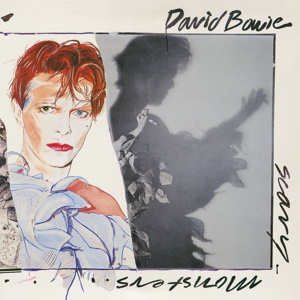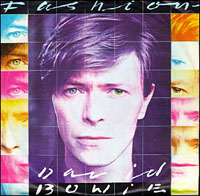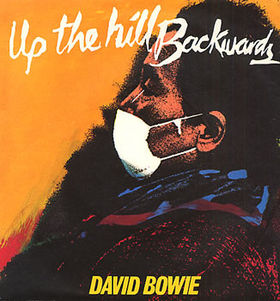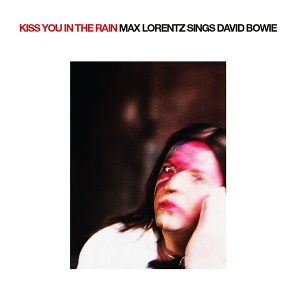
Scary Monsters (and Super Creeps), also known simply as Scary Monsters, is the 14th studio album by the English musician David Bowie, released on 12 September 1980 through RCA Records. His first album following the Berlin Trilogy (Low, "Heroes" and Lodger), Scary Monsters was Bowie's attempt to create a more commercial record after the trilogy proved successful artistically but less so commercially.
The "Alabama Song"—also known as "Moon of Alabama", "Moon over Alabama", and "Whisky Bar"—is an English version of a song written by Bertolt Brecht and translated from German by his close collaborator Elisabeth Hauptmann in 1925 and set to music by Kurt Weill for the 1927 play Little Mahagonny. It was reused for the 1930 opera Rise and Fall of the City of Mahagonny and has been recorded by the Doors and David Bowie.

"Fashion" is a song by the English musician David Bowie from his 14th studio album Scary Monsters (1980). Co-produced by Bowie and Tony Visconti and recorded from February to April 1980 at New York and London, it was the last song completed for the album. Originating as a reggae parody titled "Jamaica", "Fashion" is a post-punk, dance and funk track structurally similar to Bowie's "Golden Years". King Crimson guitarist Robert Fripp contributed lead guitar.

Chuck Hammer is an American guitarist and soundtrack composer, known for textural guitar work with Lou Reed, David Bowie, and Guitarchitecture. As an artist, Hammer is best known for his Guitarchitecture recordings, though he is also widely regarded as a leading New York City based soundtrack composer, having scored approximately 300 documentary films. He is currently developing a series of improvisational textural guitar recordings.

"Scary Monsters (and Super Creeps)" is a song by the English singer-songwriter David Bowie, released as the title track of his 1980 album Scary Monsters (and Super Creeps). It was also issued as the third single from that album in January 1981. Coming as it did in the wake of two earlier singles from Scary Monsters, "Ashes to Ashes" in August 1980 and "Fashion" in October the same year, NME critics Roy Carr and Charles Shaar Murray labelled its release another instance "in the fine old tradition of milking albums for as much as they could possibly be worth". The song was subsequently performed on a number of Bowie tours.

"Up the Hill Backwards" is a song by the English musician David Bowie, released on his 1980 album Scary Monsters . It was later issued by RCA Records as the fourth and final single from the album in March 1981. Originally written under the title "Cameras in Brooklyn", the song was recorded between February and April 1980 at the Power Station in New York City and Good Earth Studios in London. The recording features backing vocalists, guitar contributions from Robert Fripp and acoustic guitar played by co-producer Tony Visconti. Lyrically, the song concerns the struggles of facing a crisis, partially influenced by Bowie's divorce from his wife Angie. Musically, the song contains numerous time signature changes and a Bo Diddley-inspired beat.
George Murray is an American bass guitarist best known for his work with David Bowie on a number of Bowie's albums released in the 1970s. Murray was part of Bowie's rhythm section, the D.A.M. Trio, for much of the decade, alongside drummer Dennis Davis and guitarist Carlos Alomar.
"Panic in Detroit" is a song written by the English singer-songwriter David Bowie for the album Aladdin Sane in 1973. Bowie based it on his friend Iggy Pop's descriptions of revolutionaries he had known in Michigan and Pop's experiences during the 1967 Detroit riots. Rolling Stone magazine called the track "a paranoid descendant of the Motor City's earlier masterpiece, Martha and the Vandellas' "Nowhere to Run"".
"It's No Game" is a song written by English musician David Bowie for his 1980 album Scary Monsters , featuring lead guitar played by Robert Fripp. The song is split into two parts, opening and closing the album. "(No. 1)" is musically sinister, featuring Bowie screaming lyrics and Japanese narration provided by actress Michi Hirota. "(No. 2)", a stark contrast to "(No. 1)", is much calmer, which Bowie's biographers symbolise as Bowie facing the same situation in "(No. 1)", but after the album's duration.
"Teenage Wildlife" is a song written by David Bowie in 1980 for the album Scary Monsters . Running at almost seven minutes, the song was the longest track on Scary Monsters, and Bowie's longest composition since "Station to Station" (1976), although it was surpassed in length by later tracks such as 2003's "Bring Me the Disco King" and 2016's "Blackstar".
"Scream Like a Baby" is a song written by David Bowie. It appears on the 1980 album Scary Monsters .

"Crystal Japan" is an instrumental piece written by David Bowie and released as a single in Japan in spring 1980. It was recorded during the Scary Monsters sessions that year. The instrumental was used in a Japanese commercial for the shochu Crystal Jun Rock, which also featured an appearance by Bowie, although he said at the time that the track was not specifically written for this purpose. Originally titled "Fuji Moto San", it was apparently intended to close the Scary Monsters album until replaced by "It's No Game ".

A Reality Tour is a DVD released in 2004 of David Bowie's performance at Point Theatre in Dublin, Ireland in 2003 during the A Reality Tour.

Golden Years is a 1983 compilation album by David Bowie issued by RCA Records.

Fame and Fashion is a compilation album by English musician David Bowie, issued in 1984 by RCA Records featuring songs recorded from 1969's David Bowie through 1980's Scary Monsters. It was released on LP, cassette, and CD formats. The subtitle "David Bowie's All-Time Greatest Hits" appears along with the title on LP and cassette labels, as well as on the CD face and inserts.

Bowie – The Video Collection is a video album by David Bowie, released in 1993. It included most official music videos made by Bowie between 1972 and 1990.
The Outside Tour was a tour by the English rock musician David Bowie, opening in September 1995 and lasting over a year. The opening shows preceded the release of the 1. Outside album which it supported. The tour visited stops in North America and Europe.

"Ashes to Ashes" is a song by the English singer-songwriter David Bowie from his 14th studio album, Scary Monsters (1980). Co-produced by Bowie and Tony Visconti, it was recorded from February to April 1980 in New York and London and features guitar synthesiser played by Chuck Hammer. An art rock, art pop and new wave song led by a flanged piano riff, the lyrics act as a sequel to Bowie's 1969 hit "Space Oddity": the astronaut Major Tom has succumbed to drug addiction and floats isolated in space. Bowie partially based the lyrics on his own experiences with drug addiction throughout the 1970s.

Kiss You In The Rain - Max Lorentz Sings David Bowie is the fifth album from Swedish artist Max Lorentz.

A New Career in a New Town (1977–1982) is a box set by English singer-songwriter David Bowie, released on 29 September 2017. A follow-up to the compilations Five Years (1969–1973) and Who Can I Be Now? (1974–1976), the set covers Bowie's career from 1977 to 1982, including his "Berlin Trilogy", over eleven compact discs or thirteen LPs. Exclusive to the box set are a Heroes EP, which compiles versions of his song "'Heroes'" recorded in different languages, a new version of Lodger (1979), remixed by coproducer Tony Visconti, and Re:Call 3, a compilation of non-album singles, single versions, and B-sides that serves as a sequel to Re:Call 1 from Five Years and Re:Call 2 from Who Can I Be Now? and features the Baal EP (1982) in its entirety on CD for the first time.













